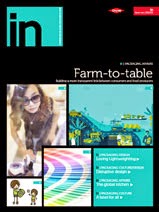When George Clooney became the face of Nespresso’s coffee pods in 2006, it spelled the beginning of a worldwide love affair with the product that allowed people to brew espresso at home with the touch of a button. The global market for fresh ground coffee pods went from $7 billion in 2010 to $17 billion in 2015. Last year, Australians spent $215 million on coffee pods.
But convenience comes with a price; made from a combination of plastics and aluminum with organic matter inside, the coffee pods are not biodegradable, nor are takeaway coffee cups and lids. It takes 150 to 500 years for aluminum and plastic capsules to break down in a landfill.
Disposable coffee cups, which look like they are made of paper, have been found to contain plastics that do not break down and are damaging to the environment. These cups have a plastic lining that doesn’t biodegrade when the cup ends up in a landfill. The petroleum oil-based plastic lining that makes them waterproof cannot be recycled with paper and cardboard collections. In fact, Planet Ark, an Australian Environmental Foundation, recommends putting them in the rubbish, rather than the recycle bin for fear of contaminating the whole load. Coffee cups are estimated to be the second-largest contributor to litter waste after plastic bottles. Australians use 1 billion disposable coffee cups each year.
Biodegradable coffee cups have been around for more than a decade but are still only a relatively small share of the market, mainly because this option comes at a price and not all cafe owners are willing to wear that cost. Some disposable coffee cups claim to be recyclable, some claim to be compostable and others are sold as biodegradable, but these claims could be misleading for a number of reasons. Whether a plastic-coated paper cup is accepted in recyclables varies from area to area, with some local councils accepting coffee cups as part of their recycling process, while others exclude them and dump them in a landfill. When the materials of these biodegradable cups break down, they are supposed to be suitable for use in composting processes. However composting is not widely available in Australia, so cups are put in household or community compost. Most compostable coffee cups still end up in a landfill.
Cups and pods aren’t the only problems associated with coffee consumption. The many tons of used coffee grounds also have an impact. When organic waste breaks down in an anaerobic environment such as a landfill site, it releases methane – a far more harmful greenhouse gas than carbon dioxide.
The good news is a growing number of Australia-based social entrepreneurs are getting creative to raise awareness and inspire coffee lovers to reduce the impact they have on our planet, according to The Guardian’s recent report.
In 2015, friends Ryan Creed and Julian Mitchell set out to solve this problem by founding Western Australia’s first urban mushroom farm in Fremantle, using waste coffee grounds to grow gourmet oyster mushrooms. Oyster mushrooms sell for upwards of $40 a kilo and are typically imported. The pair crowdfunded $30,000 and cycled around Fremantle every day picking up the waste and mixing it with mushroom spores. Last year they moved into a shipping container dedicated to growing mushrooms and began supplying mushrooms back to the very restaurants that were giving them their waste. Their company, Life Cykel , has since diverted more than 10 tons of coffee waste from landfill and grown more than 1,600kg of mushrooms. Life Cykel is now building partnerships with a range of organizations including Virgin Airlines, New Zealand’s Abilities Group, Melbourne University and other environmental and educational organizations.
Melbourne-based social entrepreneur Soula Thuring has taken the direct approach, selling biodegradable coffee cups with an additional Enviro Grow kit which turns the used cup into a plant. The $2 Grow Cup of Life kit contains a soil pellet that expands with water, a seed mat and instructions for growing kale, beetroot, rocket and other healthy foods. It can be planted in the backyard or elsewhere and it breaks down in a few months. Yet even biodegradable cups aren’t recyclable in most places, so Thurling would like to see more long-term solutions such as the on-site automated composting technology developed by Queensland-based Paul Harrey and Penelope Mitchell. These aerobic composting machines recycle organic waste into compost and soil conditioners.
Social enterprise Streat, founded in Melbourne in 2009, has won over customers with its mix of delicious coffee and food, environmental responsibility and dedication to tackling social disadvantage. Recently the enterprise teamed up with Melbourne-based coffee startup Pod & Parcel to put its coffee in biodegradable coffee pods to be used in Nespresso machines.
Nevertheless, the onus of environmentally-friendly products lies with both manufacturers and consumers, and the later need to take action in consuming the right goods, and voicing what they see or know, approve or disapprove. Awareness, knowledge, and innovation need their advocates, in order to deliver a wasteless world…









Oh! all for a cuppa! I feel sorry that I have also been contributing to this heap of rubbish when ever I travel. Looks like I will totally give up using these fake paper cups or drinking coffee itself.
I am a huge coffee drinker, and when you say coffee, I mean it brewed and not your lanky instant coffee in sachets. I never thought about the coffee grounds as being hazardous to the environment. Since coffee beans are from plants, I thought them as biodegradable and would be just back to being part of the earth. I did not know they release methane. Thank God, for Life Cykel. I do not know what I would do with my coffee grounds and would be feeling guilty enjoying my coffee while knowing that I am part of the greenhouse gas problem. The great thing is, I love mushrooms!
I am a fanatic and passionate coffee lover too, and when I say coffee I mean the same with you – still there are other coffee versions that create bigger and more difficult to manage environmental impacts – by the way, I love mushrooms too!